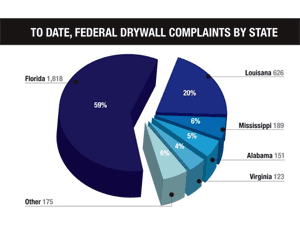The warning shot came in a federal court in Louisiana, and it may signal the beginning of the end of one of the more costly aspects of the homebuilding boom of 2004-2007. Federal Judge Eldon Fallon in New Orleans ordered Taishan Gypsum Co. Ltd. to pay seven Virginia families a total of $2.6 million to remediate defective Chinese-made drywall in their homes. The case is the first of several class-action lawsuits filed against manufacturers of material that has proven to be a veritable nightmare—and source of odors—for thousands of homeowners.

The case is considered a bellwether for the other suits against the manufacturers of defective Chinese drywall because the same court is hearing all the cases.
“The message Judge Fallon’s ruling sends to thousands of other homeowners who have been victimized is that help is finally coming—they will be made whole after the ravages of inferior Chinese drywall and will not have to bear the substantial costs of repairing their homes to get rid of it,” says Christopher Seeger, a New York lawyer who represented the Virginia homeowners in the Taishan case. A ruling is expected in the coming weeks in the second case, in which Florida homeowners sued German-owned Knauf Plasterboard Tianjin.
The $2.6-million award is welcome news not just for the Taishan-case homeowners, who typically couldn’t collect under their insurance policies, but for builders who want to get involved in remediation efforts but who have not been able to obtain financing to pay for it. As a result, some builders have had to leave the material in place.
Florida Leading in Complaints, Remediation
As politicians and government officials continue to study the best approach to the problem of Chinese drywall, remediation contractors are creating an industry standard of their own.
Edie Ousley, communications director with the Florida Home Builders Association, says the Tallahassee-based organization is taking guidance from Washington, D.C.
“The CPSC guidelines are being closely reviewed by the National Association of Home Builders, and the Florida Home Builders Association looks forward to receiving NAHB’s expert opinion following this review,” Ousley said in an email response to questions.
Homebuilders large and small have been impacted by the Chinese drywall situation in Florida, which has experienced the greatest number of related complaints. FHBA’s Ousley says the ability of homebuilders to respond varies.
“For small homebuilders, it’s more difficult to absorb the financial impact associated with remediation due to limited resources,” she says.
While the federal guidelines help address the issue, state measures are moving forward as well. The FHBA is advocating a bill moving through the Florida legislature that would encourage builders and homeowners to enter into voluntary remediation agreements.
“We are hopeful that this pro-consumer measure will help homeowners receive drywall repairs quicker, and serve as an incentive for builders with the financial ability to proceed with making repairs,” Ousley says.
As these guidelines and pending laws slowly emerge, however, the real work is beginning.



Post a comment to this article
Report Abusive Comment